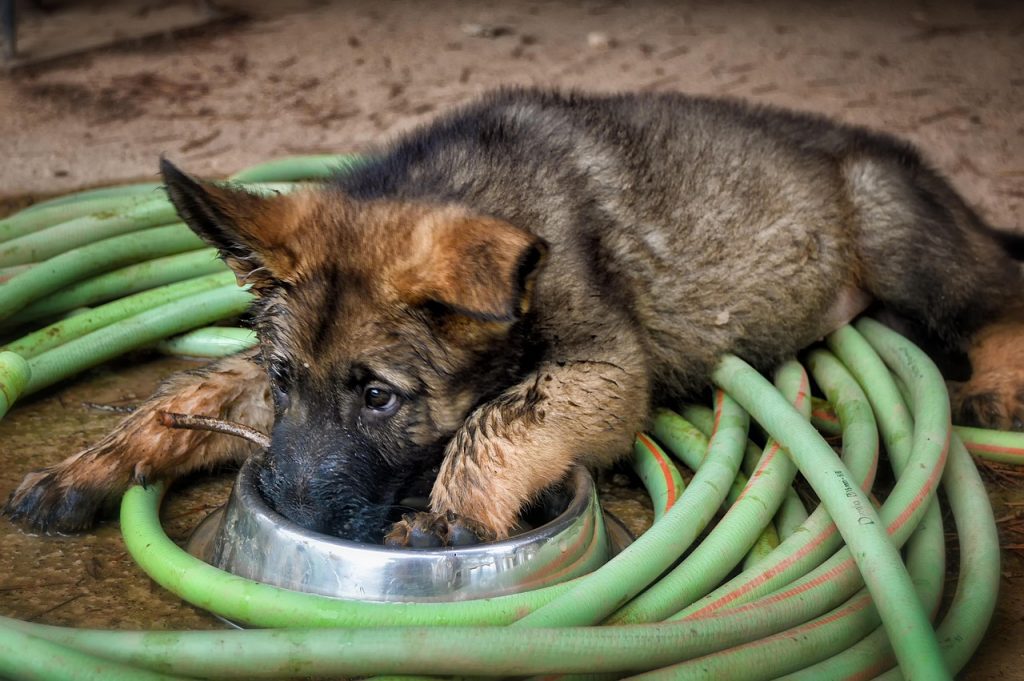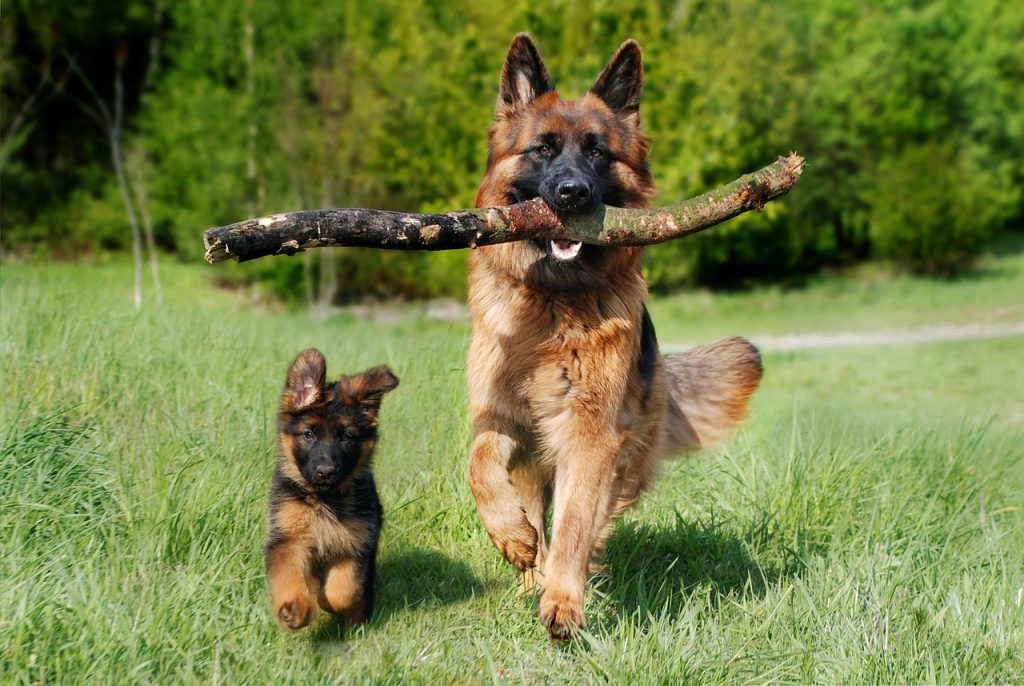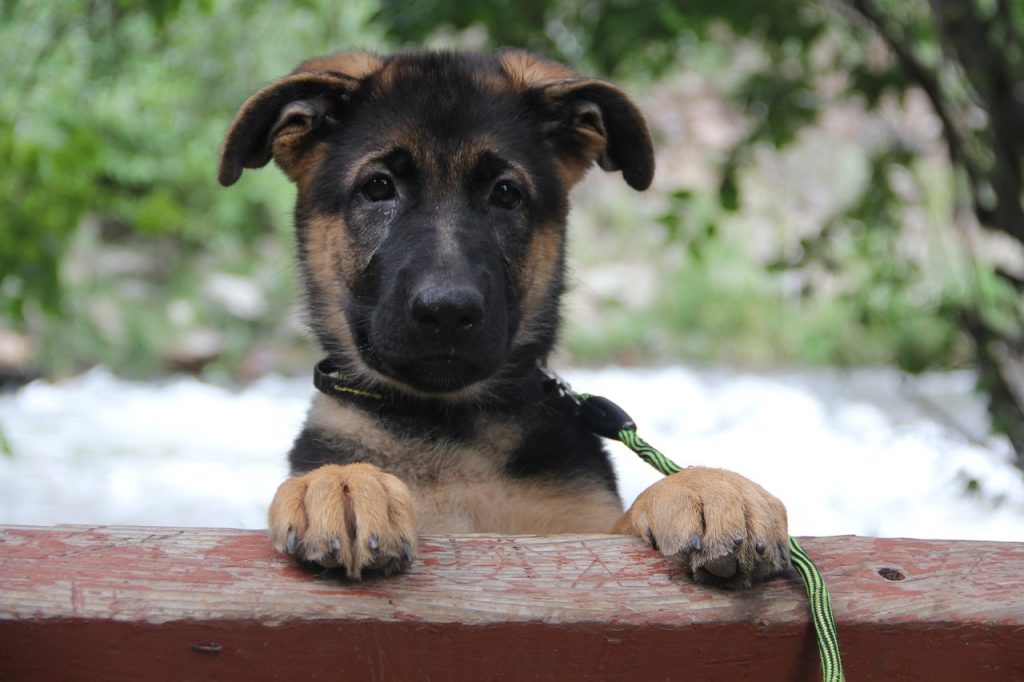Are you considering getting a German Shepherd puppy, also known as GSD? If so, it’s important to know what to expect during the crucial period of their development at two months old. At this age, GSD puppies should weigh around 10-20 pounds and are still developing their physical and cognitive abilities. As a breed, German Shepherds require high-quality dog foods to ensure proper growth and development. Don’t forget to prepare for your new doggy’s needs!
Socialization and training are essential during this period, as it sets the foundation for the future behavior of your GSD puppy, a breed known for its intelligence and loyalty. As an owner, you’ll need to provide a lot of attention and care for your new furry friend, including feeding them high-quality dog foods that meet their nutritional needs. Don’t forget to give your doggy plenty of exercise and playtime to keep them happy and healthy.
German Shepherd puppies, also known as GSD, are born small and weigh only 1-2 pounds. As a new doggy owner of this breed, it’s important to understand that they grow rapidly in just a few weeks. To ensure your GSD receives the proper care and training for a happy and healthy life, it’s crucial to choose the right dog foods designed specifically for this breed.
So, what does a two-month-old German Shepherd puppy look like? Let’s dive in and explore this new doggy breed for those who just got a new puppy!
Understanding the Growth and Weight of a 2-Month-Old German Shepherd Puppy
Average Weight of a 2-Month-Old German Shepherd Puppy
A 2-month-old German Shepherd puppy, also known as a GSD, typically weighs between 15-25 pounds. During this age, this doggy breed experiences a growth spurt and gains weight rapidly. It’s important to monitor their body weight to ensure they are at a healthy weight for their age and size. Feeding them high-quality kibble can help support their growth and development.
Importance of Monitoring Body Weight
Monitoring the weight of your 2-month-old German Shepherd (GSD) puppy, also known as a doggy, is crucial as it helps you determine if they are experiencing a healthy growth spurt or not. Puppies that gain too much or too little weight may be susceptible to health issues such as obesity, joint problems, and malnutrition. To ensure proper growth, consider feeding your GSD puppy high-quality kibble.
How Much Should a 2-Month-Old German Shepherd Weigh?
The ideal weight for a 2-month-old German Shepherd puppy, also known as a GSD or doggy of the breed, should fall within the range of 15-25 pounds. However, it’s essential to note that every puppy is unique, and their size can vary depending on genetics, diet, exercise, and overall health. Feeding them high-quality kibble is crucial to ensure they receive proper nutrition.
Supporting Growth with Proper Nutrition
German Shepherds, including old GSDs, require specific amounts of calories to support their growth and development. Feeding your doggy high-quality kibble and foods that contain all the necessary nutrients is crucial during this stage. You can also supplement their diet with vitamins or minerals if recommended by your veterinarian.


Ensuring Your Puppy Maintains Healthy Weight
To ensure your German Shepherd puppy maintains a healthy weight during this stage, make sure to feed them appropriate kibble and doggy foods.
- Monitor their food intake: Feed your new puppy an appropriate amount of kibble and meals based on their age, size, activity level, and the type of foods they need.
- Provide enough exercise and feed them with nutritious foods like kibble to keep your GSD pup healthy. Take your German Shepherd dog for walks or playtime in the yard regularly.
- Regular vet check-ups: Schedule regular check-ups with your veterinarian to monitor your GSD’s growth progress. As a German Shepherd Dog owner, it’s important to provide them with the right kibble for their meals.
- Avoid overfeeding: Overfeeding with high-calorie meals or excessive kibble can lead to weight gain and obesity which can cause various health issues later in life.
Diet and Feeding Guidelines for a 2-Month-Old German Shepherd Puppy
Feeding Schedule
It’s important to establish a consistent feeding schedule for your dog. Puppies at this age should be fed four small meals a day, rather than two larger ones, to manage their weight and calorie intake. This is because their stomachs are still small and cannot hold as much food, which can affect their energy levels.
Puppy Food
Dog owners should provide their 2-month-old German Shepherds with puppy food that contains the necessary nutrients for healthy growth and development. It is recommended to feed them meals specifically formulated for large-breed puppies, ensuring they get the right amount of calories per day.
Feeding Charts
Feeding charts can help you keep track of your dog’s meals and ensure they are getting enough calories per day. These charts typically provide guidelines on how much to feed your puppy based on their weight and age.
Dry Kibble
Dry kibble is a popular choice for feeding a 2-month-old German Shepherd puppy as it helps promote good dental health by reducing plaque buildup. Look for high-quality dog foods that contain protein, fat, carbohydrates, vitamins, and minerals. It is important to provide multiple meals per day to ensure the puppy is getting enough calories for their weight.
Human Foods
It’s important to avoid feeding your puppy human foods as they may not be suitable for their digestive system. Some meals that are toxic to dogs include chocolate, grapes, onions, garlic, avocado, and alcohol. Additionally, feeding your puppy human foods can cause them to gain weight.
In terms of how much to feed your 2-month-old German Shepherd puppy, consult with your veterinarian or refer to the feeding chart provided by the manufacturer of the dog food you choose. Keep in mind that every dog is different and may require more or fewer meals depending on their weight and individual needs.
To sum up, establishing a consistent feeding schedule with four small meals per day using high-quality puppy food specifically formulated for large breed puppies will help ensure healthy growth and development in your 2-month-old German Shepherd puppy. This is especially important for the overall health of your dog.
Appropriate Puppy Training Timeline for German Shepherd Puppies
Starting Early: 8 Weeks Old
German Shepherd puppies are known for their intelligence and trainability. That’s why it’s crucial to start training them as early as possible. At just 8 weeks old, these puppies are already capable of learning basic commands and behaviors that will set the foundation for a well-behaved adult dog.
Basic Obedience Training
The first priority when training a 2-month-old German Shepherd puppy should be basic obedience training for your dog. This includes teaching the puppy to sit, stay, come, and walk on a leash without pulling. Consistency is key when training your dog, so make sure everyone in your household is using the same commands and rewards.
Positive reinforcement is also essential during this stage of dog training. Rewarding your dog with treats or praise when they perform desired behaviors will encourage them to continue behaving appropriately. On the other hand, punishment or scolding can be counterproductive and may lead to negative associations with certain actions or people.
Potty Training
Another critical aspect of puppy training is potty training. Starting at 2 months old, you should establish a routine for taking your German Shepherd puppy outside to go potty. Take them out first thing in the morning, after meals, after naps, and before bedtime.
When your puppy does go potty outside, reward them with treats and praise to reinforce good habits. If accidents happen inside the house (which they likely will), clean them up promptly without punishing or scolding your puppy.


Consistency Is Key
Consistency is crucial throughout all aspects of German Shepherd puppy training. Use the same commands and rewards every time you train your puppy, establish consistent routines for feeding and potty breaks, and make sure everyone in your household is on board with the same approach.
It’s also important to remember that each individual dog learns at their own pace.
Socialization Training for a 2-Month-Old German Shepherd Puppy
Why Socialization Training is Crucial for a 2-Month-Old GSD Puppy
Socialization training is crucial for a 2-month-old German Shepherd puppy to prevent behavioral issues in the future. This stage of your puppy’s life is critical as it sets the foundation for their behavior and temperament in the long run. As puppies grow, they develop fears and anxieties that can lead to aggression and other behavioral problems if not addressed early on.
Socializing your GSD pup means exposing them to different people, animals, sounds, and environments so they can learn how to react appropriately. This way, when they encounter new situations or individuals later on in life, they will be less likely to feel anxious or fearful.
How Crate Training Can Help with Potty Training and Provide a Safe Space for Your GSD Puppy
Crate training can be an effective tool for socializing your GSD pup by providing them with a safe space while also aiding in potty training. Dogs are naturally den animals, which means that they like having their own space where they can retreat when feeling overwhelmed or tired.
To crate train your GSD puppy:
- Choose an appropriate-sized crate that will allow them enough room to stand up and turn around.
- Place soft bedding inside the crate.
- Introduce your puppy to the crate slowly by leaving treats inside it and allowing them to explore it at their own pace.
- Start closing the door for short periods while you’re home so that your pup gets used to being inside.
- Gradually increase the amount of time you leave them in there until they can stay comfortably for several hours at a time.
Remember not to use the crate as punishment or leave your puppy inside it all day long.
Exercise Needs of a 2-Month-Old German Shepherd Puppy
High Activity Level
At two months old, German Shepherd puppies have a high activity level and require regular exercise to stay healthy and happy. Without enough exercise, they can become bored and destructive.
Ideal Activities
Short walks and playtime are ideal activities for a 2-month-old German Shepherd puppy. Walking helps build their muscles and improves their cardiovascular health. Playtime is also essential for them to socialize with other dogs and people.
Mindful of Joint Issues
It’s important to be mindful of joint issues in young puppies. Over-exerting them during exercise can lead to joint problems later in life. Instead, focus on low-impact exercises that won’t put too much strain on their joints.
To train your 2-month-old German Shepherd puppy, start by teaching basic commands such as “sit,” “stay,” and “come.” Use positive reinforcement techniques like treats or praise when they follow the command correctly.
When training your puppy, keep sessions short (no more than 10-15 minutes) to prevent them from getting bored or overwhelmed. Consistency is key; try to practice commands every day at the same time so that your puppy gets used to the routine.
A 2-month-old German Shepherd puppy will sleep around 18-20 hours per day. Make sure they have a comfortable bed or crate where they can rest undisturbed. Avoid waking them up during nap time unless it’s an emergency.
Health and Grooming Tips for a 2-Month-Old German Shepherd Puppy
Regular grooming is important for a 2-month-old German Shepherd puppy to maintain healthy skin and coat.
Grooming your German Shepherd puppy is essential to keep them looking and feeling their best. At two months old, your pup’s coat is still developing, so regular brushing helps remove dead hair and distribute natural oils throughout the fur. Brushing also stimulates blood flow, which promotes healthy skin.
To groom your 2-month-old German Shepherd puppy, you should:
- Use a slicker brush to remove dead hair from their coat.
- Gently comb through any tangles or mats using a wide-toothed comb.
- Trim their nails regularly to prevent overgrowth and discomfort.
- Clean their ears with a damp cloth to prevent infections.
- Bathe them occasionally with a gentle dog shampoo designed for puppies.
By establishing a regular grooming routine at an early age, you are helping your German Shepherd puppy develop good habits that will benefit them throughout their life.
Proper nutrition and exercise are crucial for the overall health and growth of a 2-month-old German Shepherd puppy.
Your 2-month-old German Shepherd puppy needs proper nutrition to support their growth and development. Feeding them high-quality puppy food that contains all the necessary nutrients is essential. You can also supplement their diet with treats made specifically for puppies.
In addition to proper nutrition, exercise is also crucial for your pup’s well-being. At this age, they need plenty of playtime and opportunities to run around in a safe environment. Engage in activities such as fetch or tug-of-war with soft toys to help build muscle strength while keeping them entertained.
Remember not to over-exercise your young pup, as it may cause joint damage in the long run. The rule of thumb is five minutes of exercise per month of age up until twice daily sessions of fifteen minutes each at six months old.


Obedience Training for a 2-Month-Old German Shepherd Puppy
Start Early and Be Consistent
Training a German Shepherd puppy at 2 months old is crucial to ensure they grow up to be well-behaved dogs. The ideal time to start obedience training is between 8-12 weeks old when the puppy’s brain is still developing. At this age, they are eager to learn new things and are more receptive to training.
Consistency is key when teaching commands to a 2-month-old German Shepherd. Use the same words and gestures each time you give a command, so your puppy can easily understand what you want them to do. It’s also essential that everyone in the household follows the same rules and uses the same commands during training sessions.
Short Sessions Are More Effective
Training sessions should be short, around 5-10 minutes long, several times a day. Puppies have short attention spans and get tired quickly, so it’s important not to overdo it. Shorter sessions will help keep your puppy engaged and focused on learning.
Teach Basic Commands First
The most important thing to teach a 2-month-old German Shepherd is basic commands such as “sit,” “stay,” and “come.” These simple commands lay the foundation for more advanced training later on.
To teach your puppy these basic commands:
- Start with “sit” – Hold a treat above your puppy’s head while saying “sit.” When they sit down, reward them with the treat.
- Move onto “stay” – Once your puppy has mastered sitting, add in the command “stay.” Ask them to sit, then take one step back while holding up your hand like a stop sign. If they stay in place for a few seconds, reward them with praise or treats.
- End with “come” – To teach your pup to come when called, say their name followed by “come.” When they come to you, reward them with praise or treats.
Agility Training for a 2-Month-Old German Shepherd Puppy
Agility training is an excellent way to improve your German Shepherd puppy’s coordination, balance, and overall health. Starting at two months old, your puppy is ready to begin basic agility exercises that can help develop its physical abilities while providing mental stimulation. However, it is important to keep in mind that you should avoid strenuous exercises that may harm the puppy’s developing bones and muscles.
Basic Agility Exercises
At two months old, your German Shepherd puppy is still developing physically and mentally. Therefore, it is essential to start with basic agility exercises such as crawling through tunnels and walking over low obstacles. These activities will help your puppy develop coordination skills while building confidence.
Avoid High Jumps
While your German Shepherd may be eager to jump high or run fast, it’s crucial to remember that they are still growing and developing. High jumps or strenuous exercises can cause damage to their muscles or bones, leading to long-term health problems. Instead of jumping high, encourage your puppy by using positive reinforcement techniques such as treats and praise.


Positive Reinforcement Techniques
Positive reinforcement techniques are an effective way of encouraging your German Shepherd during training sessions. Treats and praise can be used as rewards for good behavior while also helping build trust between you and the puppy. Consistency in rewarding good behavior will reinforce the desired actions making them more likely to repeat them in the future.
Consistency And Patience Are Keys
Consistency and patience are key when training a 2-month-old German Shepherd puppy in agility. It takes time for puppies to learn new things; therefore, you should not expect immediate results from one training session. Take time out each day to work with your pup consistently until they master basic agility exercises before progressing onto more advanced ones.
Conclusion: Raising a Happy and Healthy 2-Month-Old German Shepherd Puppy
Congratulations on welcoming a new member to your family! Raising a 2-month-old German Shepherd puppy requires patience, commitment, and love. It is essential to understand their growth and weight, diet and feeding guidelines, training timeline, socialization training, exercise needs, health and grooming tips, obedience training, and agility training.
To ensure your German Shepherd puppy grows into a healthy adult dog with good behavior, you need to provide them with proper care. This includes regular veterinary check-ups, balanced nutrition with high-quality food, plenty of exercises, and mental stimulation through playtime and training sessions.
Remember that socialization is key for your pup’s success in the future. Introduce them to different people, animals, sights, and sounds at an early age to help them develop confidence and reduce anxiety.
Last but not least important is obedience training. Be patient but consistent when teaching commands such as sit or stay. It will help establish trust between you two while making sure they are safe in any situation.
Overall raising a happy and healthy 2-month-old German Shepherd puppy takes time, but it’s worth it. With proper care from you as their owner, coupled with love from the whole family, they will grow up to be loyal companions for years to come!
FAQs
Q: What should I feed my 2-month-old German Shepherd puppy?
A: A balanced diet consisting of high-quality protein sources, such as chicken or beef along with vegetables like sweet potatoes or carrots, is recommended. Consult with your veterinarian about the appropriate amount of food for your specific pup’s size and breed.
Q: How much exercise does my 2-month-old German Shepherd need?
A: Puppies require less exercise than adult dogs; however daily walks along with playtime can keep them active enough without overexerting themselves.


